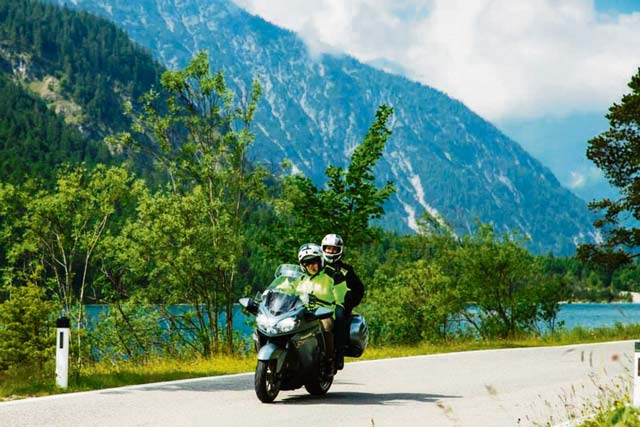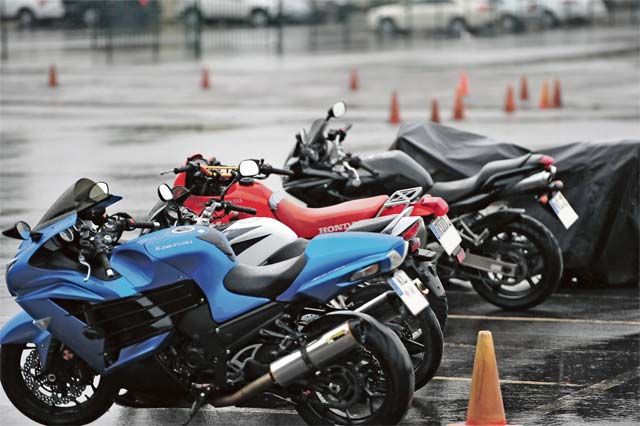Motorcycle riders from across the 21st Theater Sustainment Command shared experiences, best practices and camaraderie at the sixth annual 21st TSC Motorcycle Safety Day June 18 at the Motorcycle Safety Course on Kapaun Air Station.
The annual event, put on by the 21st TSC Safety Office with participation by Motorcycle Safety Foundation certified rider coaches, the American Red Cross as well as members of the 86th Airlift Wing and the 21st TSC Family Readiness Group, aims to improve overall safe riding skills of motorcyclists in the local military community.

Helmets, ankle high boots, reflective gear and rash-resistant gloves and clothing play a major role in whether a person is able to survive a motorcycle accident. The 21st TSC Motorcycle Safety Day provided expert riders from across the TSC the opportunity to share safety tips, mentorship and camaraderie while reviewing key skills for safe riding.
“We’ve held a motorcycle safety event every year since 2009 with a great outcome and lots of fun,” said Hans Orlich, 21st TSC safety specialist. “The bottom line is that we want to reduce the number of accidents with motorcycles. Through training we can slow down and eliminate the accident trend – you can never have enough training.”
Rainy weather prevented the group from taking their bikes out on the MSF course, but riders discussed best practices and safe riding skills and shared tips on how to enjoy the roads in Europe safely. Volunteers from the Red Cross and the 86th Airlift Wing Medical Group provided a first-aid demonstration to help riders understand how to clean a wound and take care of themselves or another rider in their group if an accident were to occur on the road.
Bob McGaffin, a 45-year motorcycle enthusiast, MSF rider coach trainer and the safety manager at the 18th Military Police Brigade, led the discussions, sharing personal experiences and motorcycle mishaps.
“Most, if not all, motorcycle accidents are entirely preventable,” said McGaffin. “Europe is one of the best places in the world to ride a motorcycle, but we cannot underestimate the dangers of riding. If you ride a motorcycle, you will have a close call, and if you don’t train or practice your skills, you have a 95 percent chance of not doing the right thing in an emergency. You cannot let yourself get in a situation where you need to use your emergency skills. Awareness is key.”
According to Army Safety Office data, Soldiers suffered 23 motorcycle fatalities during fiscal year 2014; as of June 15, there have been 10 Army motorcycle fatalities so far this year. This number represents almost a quarter of all off-duty fatalities.
Though U.S. Army Europe has not had any motorcycle fatalities this year, motorcycle accidents still represent a major cause of injuries and fatalities for U.S. personnel serving in Europe.
“Riding in Europe is totally different than riding in the states,” said Walter Chemerka, supply activity division chief at the Theater Logistics Support Center – Europe and 35-year motorcycle enthusiast. “Curves are sharper and roads are different. You need to adjust your riding a bit more to accommodate the different passing rules, speed limits, roads and tires.”
Sgt. Jessica Garrett, a reception, staging, onward movement and integration noncommissioned officer with the 21st TSC’s 1st Human Resources Sustainment Center, emphatically agreed. “It’s faster. The curves are real,” she said.

Motorcycles sit outside of the MSF training offices on Kapaun Air Station during the sixth annual 21st TSC Motorcycle Safety Day training event June 18. Though the rainy weather prevented the group from taking their bikes out on the course, riders were still able to discuss best practices and safe riding skills while sharing tips on enjoying the roads safely in Europe.
The training day coincides with peak motorcycle riding season in Europe and the Army’s summer safety campaign.
“Accidents are always a risk, but days like today really help make a difference,” said Chemerka. “Today is about mentorship, friendship and riding — we can learn so much from each other and focus on being safer.”







